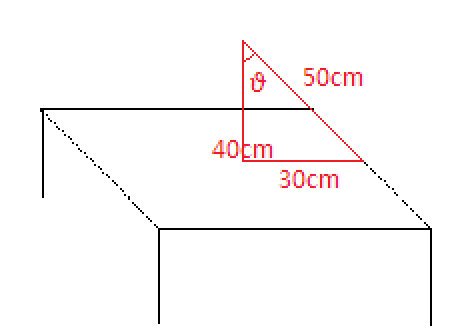Question
Question: A lamp of luminous intensity \(20\,Cd\) is hanging at a height of \(40\,cm\) from the centre of a sq...
A lamp of luminous intensity 20Cd is hanging at a height of 40cm from the centre of a square table of side 60cm . The illuminance at the midpoint of the side of the table will be
A. 125 lux
B. 100 lux
C. 64 lux
D. 32 lux
Solution
Find the distance of the point where the illuminance of the lamp is to be calculated from the source of light (lamp). Using Lambert’s law, the illuminance can be calculated. Illuminance is the total luminous flux incident on a surface, per unit area.
Complete step by step answer:
We need to find the distance between the midpoint of the side of the table from the lamp. Let us draw an appropriate diagram for the same:

The height at which the lamp is hanging, h=40cm from the base of the table.
The length of the square table is l=60cm therefore, the base of the triangle will be half of the base length, as the lamp is placed exactly at the centre, 2l=30cm
As we can clearly see, that 30,40 forms a Pythagorean triplet with 50cm . Thus, the distance of the midpoint on the side from the lamp is d=50cm
The given values are:
Luminous intensity of the lamp, L=20Cd
cosθ=54 (from the diagram)
Lambert’s law states that light intensity lost during propagation is directly proportional to intensity and path length and inversely proportional to the square of distance from the source.
As per Lambert’s law, the illuminance at the midpoint of the side of the table will be given as:
I=d2Lcosθ
Substituting the values, we get
⇒I=(0.5)220×54
I=64 lux
The illuminance at the midpoint of the side of the table will be 64 lux.
So, the correct answer is “Option C”.
Note:
Lambert’s law is used to find the loss of light intensity at a point.
The SI unit of illuminance is lux and the non-SI unit followed in the US is foot-candle.
Lambert’s law relates intensity with illuminance.
The illuminance is proportional to cosine of the angle between the distance and height.
